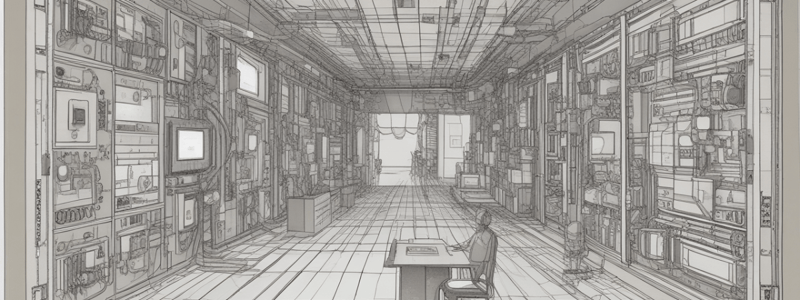Podcast
Questions and Answers
What do actors in SSD represent?
What do actors in SSD represent?
- Internal system components
- Domain objects in the system
- Entities that interact with the system from outside (correct)
- System events generators
What is the purpose of Operation Contracts in SSD?
What is the purpose of Operation Contracts in SSD?
- To define system behavior in terms of state changes (correct)
- To represent system events in sequence
- To model domain objects
- To describe system operations without context
What is represented by a dashed line in SSD?
What is represented by a dashed line in SSD?
- Lifeline (correct)
- System Boundary
- Actor
- Event
What do pre-conditions in Operation Contracts describe?
What do pre-conditions in Operation Contracts describe?
What is the primary focus of SSD?
What is the primary focus of SSD?
What do post-conditions in Operation Contracts describe?
What do post-conditions in Operation Contracts describe?
What is the role of Operation Contracts in SSD?
What is the role of Operation Contracts in SSD?
How are systems treated in SSD?
How are systems treated in SSD?
What is system behavior?
What is system behavior?
What does a system sequence diagram illustrate?
What does a system sequence diagram illustrate?
What is the main difference between standard sequence diagrams and system sequence diagrams?
What is the main difference between standard sequence diagrams and system sequence diagrams?
What is the purpose of a system sequence diagram?
What is the purpose of a system sequence diagram?
What does an object in a system sequence diagram represent?
What does an object in a system sequence diagram represent?
What is the relationship between SSDs and use case diagrams?
What is the relationship between SSDs and use case diagrams?
What notation style is used in system sequence diagrams?
What notation style is used in system sequence diagrams?
What is the main purpose of a use case diagram?
What is the main purpose of a use case diagram?
Flashcards are hidden until you start studying
Study Notes
System Behavior
- System behavior describes what a system does, without explaining how it does it.
- A system sequence diagram (SSD) is a fast and easily created artifact that illustrates input and output events related to the systems under discussion.
System Sequence Diagrams (SSDs)
- A SSD is a picture that shows, for a particular scenario of a use case, the events that external actors generate, their order, and inter-system events.
- SSDs are a type of sequence diagram in UML, following the Unified Modeling Language style and notation.
- SSDs show sequences for specific use cases, unlike standard sequence diagrams that show progression of events over time.
SSD vs. Sequence and Use Case Diagrams
- Standard sequence diagrams show progression of events over time.
- Use case diagrams represent a user's interaction with the system.
- SSDs are part of the Use-Case Model, visualizing interactions implied in the use cases.
SSD Notations
- Objects are represented by a box shape with an underlined title, modeling the system as a black box.
- Actors are represented by stick figures, showing entities that interact with the system.
- Events are represented by dashed lines (lifelines), showing system events generated by actors.
SSD Example
- SSD treats all systems as a black box, emphasizing events that cross the system boundary from actors to systems.
Operation Contracts
- Contracts for operations help define system behavior, describing the outcome of executing a system operation in terms of state changes to domain objects.
- Contracts describe detailed system behavior in terms of state changes to objects in the Domain Model, after a system operation has executed.
Operation Contracts Components
- Pre-conditions are conditions that the state of the system must satisfy before the execution of the operation.
- Post-conditions are conditions that the system state has to satisfy after the execution of the operation.
Operation Contracts Schema
- Operation: name of operation (parameters)
- Cross Reference: the Use Cases in which the OC occurs
- Preconditions: notable assumptions about the state of the system or objects in DM before execution
- Postconditions: state of objects in DM after execution of operation
Studying That Suits You
Use AI to generate personalized quizzes and flashcards to suit your learning preferences.




